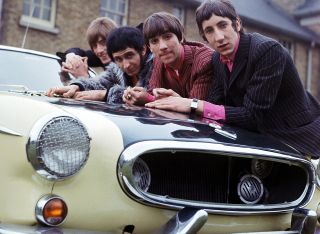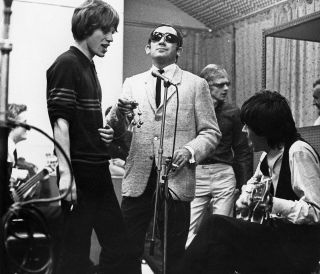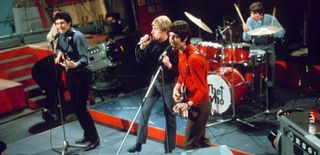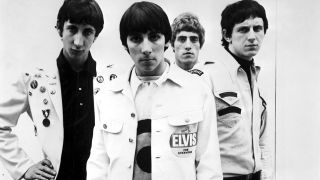In the summer of 1966 there was no better place to enjoy a night of outright debauchery than at Lionel Bart’s house. The composer of the West End musicals Fings Ain’t Wot They Used T’Be and Oliver! lived in a mansion, nicknamed The Fun Palace, in Fulham, West London.
Bart’s parties were famous for their extravagance and the calibre of his guests: Princess Margaret, The Beatles, Joan Collins and members of the World Cup-winning England football squad were among the guests who drank and danced the night away in 1966. Anyone so inclined could also make good use of the Fun Palace’s many well-appointed bedrooms, help themselves from a bowl of drugs kept in the hallway, or visit Lionel’s secret sauna accessed via a dummy wardrobe.
Besides composing West End musicals, Bart was a pop music buff who’d written hits for Tommy Steele and Cliff Richard. Through his friendship with The Who’s managers Kit Lambert and Chris Stamp, he’d also became a regular whenever The Who played at London’s Marquee club.
The Who in early 1966 were loud, violent and uncompromising. But the composer of Oliver! would unknowingly help Pete Townshend invent the rock opera.

That same summer, Townshend made a recording that changed The Who’s fortunes forever. He and his friend, music critic Ray Tolliday, created a joke birthday present for Kit Lambert in Townshend’s studio. It was a recording of a 10-minute Gilbert And Sullivan-style opera titled Gratis Amatis (Latin for ‘free love’). It was dedicated to Lambert and Lionel Bart.
Both men were enthusiastically homosexual at a time when it was still illegal in Britain. “Lionel was hanging around The Who because he liked the boys in the audience,” Townshend said in 2014. “Many of the mod boys – although they wouldn’t admit it – were trying to be gay. It was considered radical to take drugs, listen to R&B, dance on your own and then maybe go and shag Lionel Bart.”
Townshend recalled his first attempt at opera: “The opening line went: ‘Gratis amatis/I love Lionel Bart-is.’” Its grand finale was sung by Townshend and Tolliday in Goon Show-style squeaky voices, and was meant to convey Lionel reaching orgasm: “It went: ‘He’s coming, he’s coming, he’s coming… He’s c-o-m-e’ – breathe out,” said Townshend.
Pete presented Kit with his birthday present. But he didn’t laugh. Instead Lambert took Townshend for lunch. “He said: ‘This is great, these joined-up pieces of music, creating an opera using pop music.’” Lambert urged Townshend to do something similar with The Who.

Gratis Amatis marked the start of The Who’s first foray into rock opera, 1966’s A Quick One, While He’s Away. But there were several detours along the way.
To the outside world, The Who appeared untouchable. They’d just had their fourth Top 10 hit, Substitute. But behind the scenes they were deeply in debt, and embroiled in a legal dispute with their first producer, Shel Talmy. Relationships within the band were equally messy. Drummer Keith Moon was taking so many drugs he couldn’t remember recording Substitute, and vocalist Roger Daltrey was threatening to quit because he was sick of his bandmates taking drugs.
The Who’s conflicted nature was never more apparent than in 1966. In March the band appeared on the cover of the Observer colour supplement; a serious accolade for a pop group at the time. Photographer Colin Jones took the cover photo in a Manchester hotel room. But the accompanying article failed to mention that The Who were expelled from the hotel after Daltrey fired a shotgun out of the window. Or that on the overnight train back to London, Moon chased Townshend through the sleeper carriage while brandishing a knife. “I don’t think I’d ever met a band who were so antagonistic towards each other,” the photographer marvelled.
Kit Lambert knew The Who’s antagonistic image was great for business, but he also believed they were capable of much more. Kit was the son of Constant Lambert, the late composer and director of the Royal Ballet. As soon as he started co-managing The Who, Lambert separated Townshend from the others and moved him into his flat in Belgravia. He introduced the guitarist to the works of classical composers William Walton, Verdi and Purcell, and took him to the Royal Opera House.
“Opera as we know it is absolutely defunct,” Lambert declared. “One needs a completely fresh approach.” Kit feared that The Beatles would soon stage an opera if The Who didn’t get there first.
“Roger and I still felt tied to the bluff, tough sound we had developed in The Who’s gigs,” said Townshend. “But I was becoming obsessed with the bigger idea: could I write a real opera?”
Egged on by Lambert, Townshend’s first attempt after Gratis Amatis was Quads, a story set in the future where parents can choose the sex of their offspring. A couple who request four daughters are given three daughters and a son instead. But when Townshend needed another Who single, he turned Quads into I’m A Boy.
Roger Daltrey became the voice of the unwitting transvestite, Bill, forced by his parents to wear a dress and a wig. “At first I didn’t know how to sing it,” Daltrey said. “Then I realised I had to become the character of the boy.” Released in August ’66, I’m A Boy peaked at No.2 in the UK, and encouraged Townshend to make another attempt at “a real opera”.
It was debatable, though, whether it would be written for The Who. Nobody was sure if the group would be around much longer. In May, a disillusioned Daltrey had quit for a fortnight, forcing them to perform as a trio. Seventeen-year-old Robert Plant saw the three-man Who at Kidderminster Town Hall, felt sorry for them and offered his services. Townshend declined.
In the same month, Keith Moon attended a clandestine jam session with The Yardbirds’ guitarists Jeff Beck and Jimmy Page. The result was the fiery instrumental Beck’s Bolero, and rumours of a new group. Even John Entwistle, The Who’s stoic bass player, considered joining the Moody Blues, or throwing in his lot with Moon and Page.
When Townshend hit a drunken Moon with his guitar after a shambolic gig at Newbury’s Ricky Tick club in May, the drummer walked out, taking Entwistle with him. “We sat in different nightclubs and planned our careers,” said Entwistle. “I often wonder what would have happened if [Moon and I] had gone away and formed Led Zeppelin.”
Ultimately, The Who’s gravitational pull was too strong. Both drifted back – and waited for Townshend to tell them what to do next.
Townnshend had big plans. He’d rented a Bechstein piano from Harrods and was composing an opera titled Rael, a futuristic fantasy in which Communist China invades Israel and, later, the rest of the world. “It was an audacious piece,” he said, “and was meant to be a two-and-a-half hour epic.”
Townshend was now living in a top-floor flat in Wardour Street in the heart of what Time magazine had recently called “London: The Swinging City”. Among the British artefacts depicted on the cover of Time’s ‘Swinging London’ issue was a Who T-shirt. The article inside was a gushing love letter to a place where “everyone parties with everyone else”. The Who, especially Townshend, epitomised this exciting new world.
At the beginning of the year, Townshend had appeared on the pop culture TV show A Whole Scene Going, and become friends with its co-host, Private Eye cartoonist and songwriter Barry Fantoni.

“Pete was a very bright, driven young man,” says Fantoni. “The world of the arts was like a chevron back then. And the spearhead was pop music. Everything else in the arts followed behind.”
Being on TV and hanging out with a pop star meant access to the best places and the most interesting people. One night it was all back to Marianne Faithfull’s with Paul McCartney and Mick Jagger; the next dining at a restaurant in the King’s Road where the food was dreadful but Michael Caine was at the next table. “There’d be all these people outside, pressed to the glass, trying to get in,” says Fantoni. “Once you’d been on telly and were a star, you could get anything.”
Fantoni considered Townshend “more interesting than Paul McCartney”, but compared the rest of The Who to “football players that sang”. There was a visible distance developing between Townshend and his bandmates, compounded by the fact that, as their main songwriter, he was earning more money.
Visitors to his Soho eyrie noticed an arrogant streak that had grown along with his stardom. One day, Townshend grabbed the large stone planter he used as a waste-bin, opened the window and tipped its foul contents onto Wardour Street below. One night, he deliberately tore up a £5 note in front of one of his penniless old art-student friends. Townshend might have been the crown prince of Swinging London but, as he later wrote in his memoir Who I Am, “I had become disaffected… depressed and paranoid”.
In July, Lambert and Stamp settled out of court with Shel Talmy. The Who were free to record with whomever they wished. But for the next five years Talmy would take a five-per-cent royalty on their recordings. They were under even more pressure to keep having hits and earning money.
The Bechstein went back to Harrods, and _Rael _the rock opera was put on hold. A heavily abridged version would later appear on 1967’s The Who Sell Out. Instead, the group dashed into London’s IBC Studios to record a new single, Happy Jack, a song about an eccentric who lived on the beach on the Isle of Man. It was far removed from tales of enforced cross-dressing and Communist China.
Co-manager Chris Stamp had cut a deal with The Who’s publishers, whereby Daltrey, Entwistle and Moon received advances of £500 each for writing two songs on the Who’s next album. Besides the financial rewards, it was good for band morale.
The Who’s second album, A Quick One, was recorded between September and November 1966. Townshend initially contributed Don’t Look Away, Run Run Run and the power-pop anthem So Sad About Us. Entwistle offered Whiskey Man and Boris The Spider. Moon delivered I Need You and a marching-band instrumental, Cobwebs And Strange. Daltrey managed only the Buddy Holly-inspired See My Way.
“The atmosphere in the studio was one of bizarre, intensely chaotic creativity,” recalled Chris Stamp. Keith Moon’s creativity extended to decorating the sculptured cherubs surrounding the studio fireplace with hand-drawn penises. The studio caretaker threatened them with expulsion, but couldn’t prove Moon was the culprit.
Besides, The Who had bigger things to worry about. Even after they’d cut a version of Martha And The Vandellas’ Heat Wave, there was still more than 10 minutes on the album to be filled.
Lambert visited Townshend and pleaded for more material. With a deadline looming, Townshend had the incentive he needed and finally wrote his first ‘rock opera’. A Quick One, While He’s Away contained six “joined-up pieces of music” with a theme of what Stamp described as “love, betrayal and forgiveness.”
In fact, A Quick One was an unsettling story about a young girl abandoned by her lover and seduced by ‘Ivor, an old engine driver’. When her boyfriend returns she admits her infidelity and begs for forgiveness. Musically it meshed together The Who’s R&B influences with music-hall humour and early psychedelia. But its lyrics, about predatory, inter-generational sex revealed more about the “disaffected, depressed and paranoid” Pete Townshend than he realised.
Aged six and with his parents’ marriage in trouble, Townshend had been sent to live with his grandmother, Denny, in Westcliff-on-Sea, Kent. After Townshend’s 2003 arrest for viewing online child pornography, he revealed that Denny had psychologically abused him and that he might have been sexually abused by one of her boyfriends. After his parents were reconciled, Townshend returned to London to live with them, and never revealed what had happened to him.
A Quick One, While He’s Away was, he admitted later, “a semi-autobiographical piece about child abuse”. But he didn’t know that when he wrote it. Reading the lyrics now, it’s hard to understand how he didn’t make the connection.
In Who I Am, Townshend explained how its different movements related to real-life events. Her Man’s Gone was about being sent away by his parents; The Crying Town was the young Pete sobbing for his absent mother and father; Ivor The Engine Driver was an amalgam of the bus drivers who worked opposite Denny’s flat, one of whom may have been his abuser; and You Are Forgiven was inspired by his mother coming to ‘rescue’ him. In 2014, The Who revived A Quick One While He’s Away for their 50th anniversary tour. Its finale saw Townshend thrashing his guitar and roaring its closing lyric, _‘You are forgiven’, _as if he was still exorcising some demons.
But when A Quick One appeared in December 1966, its secrets were well hidden. Instead, its cover illustration, by future Yellow Submarine artist Alan Aldridge, embodied the bold colours and blurred lines of Swinging London. As Chris Stamp later pointed out, A Quick One seemed to scream: “Mary Quant, Biba, Kings Road and Carnaby Street!”
The album became a Top 5 UK hit. Better still, its 10-minute mini-opera proved The Who were thinking beyond the confines of the pop single. Paul McCartney told Townshend how much he loved the title track and that it was “exactly the sort of thing” The Beatles were working towards.
The Who’s 1966 was a turning point. Three years later they would release their full-blown rock opera Tommy, and became one of the biggest bands in the world. Gratis Amatis and the sound of Lionel Bart ‘coming’ had paid greater dividends than Pete Townshend could possibly have imagined. With Tommy, The Who would enter the 1970s and a fun palace of their own. Sadly not all of them would make it out alive.


